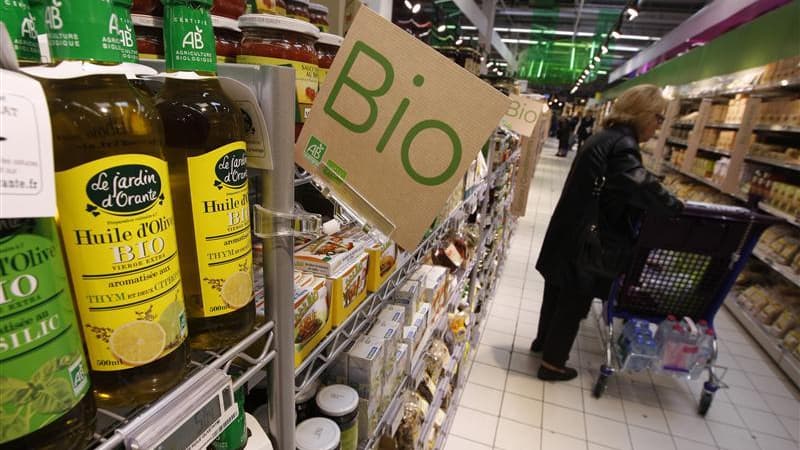Organic is no longer a recipe. After years of euphoria, sales of organic products have been in constant decline since 2021. So much so that the National Federation of Organic Agriculture (Fnab) called this Thursday for a “general mobilization” to save the sector and urged the Government to ” act urgently so as not to watch with crossed arms the burial of France’s agroecological transition”.
If producers are so concerned, it is because the organic market crisis has worsened with inflation, which should represent an average additional cost of 990 euros per household in 2023 compared to 2021, according to NielsenIQ. In this context, the French conduct arbitrations. According to the panelist, they certainly shop more frequently (+6.7 purchase acts per household on average), but they put fewer items in the shopping cart (-0.9 items purchased per act).
And it is organic products that take the worst part, with sales of 8.6% in specialized stores and 4.6% in large distribution in 2022, according to figures from Agence bio. A finding shared by Nielsen, who notes a continued decline in organic since the start of the year. According to the panelist, out of 100 payments in March, 23 contained at least one organic article (3.9% of volumes), compared to 25 in 2022 (4.3%) and 26 in 2021 (4.4%).
Most of the departments affected by the drop in organics
To illustrate this trend, Nielsen looked at two iconic organic products. First organic milk, which represented 12.6% of milk sales in supermarkets in the first quarter of 2023, compared to 14% a year earlier and 14.8% two years earlier. Then organic eggs, whose weight in total egg sales has fallen from 27.2% at the beginning of 2021 to 24.4% today.
Apart from the drive (+11%) and hard discount (+4.2%) brands, all other distribution channels saw organic sales collapse between March 2020 and March 2023: -15.6% in volume in hypermarkets , -10% in supermarkets, -5.3% in convenience stores, etc. Most departments are affected, with the exception of frozen salty (+15.6%) and sweet (+14.3%) and the beauty and hygiene department (+55%), where organic continues to be a buoyant label. The sections of fresh non-dairy (-27.3%), fresh-dairy (-24.7%) and non-alcoholic liquids (-9.4%), on the other hand, registered the strongest decreases.
The return of inflation has obviously not benefited the organic market. Especially since the French cite “affordable prices” (18.1%) as the main reason that encourages them to choose a brand, ahead of “safety and hygiene guarantees” (13.1%) and “options healthier” (13%). The criteria “environmentally friendly/sustainable” (11.2%) only ranked fourth, tied with “family or trusted brand” (11.2%).
Some “alternative” products are working fine
Not to mention, for the French, consuming “sustainably” isn’t just about organic produce. Many of them say they are sensitive to claims of “sustainable packaging,” “zero waste/reduction,” or even “clean energy products.” In this context, the consommateurs délaissent the bio pour d’autres produits dits “alternatifs” qui continuent de performer malgré l’inflation: +24.9% sur un an pour les “sans pesticide”, +17.6% pour les ” plein air”, +13.8% for “without conservateur”, +12.8% for “responsible label” products, +9.1% for “without gluten”, +7.1% for “without gluten” Palm oil”…
These “sustainable” products are generally more affordable than organic products. For example, the average price of a box of 6 organic eggs is 2.78 euros, according to statements by Nielsen, compared to 2.33 euros for “red label” eggs, 1.90 euros for “retail” eggs. open air” and the 1.62 euros for eggs from hens raised “in the field”. Likewise, the average price per kilo of canned organic green beans is 4.62 euros, much more than the “pesticide-free” version (2.51 euros) or the conventional version (1.86 euros).
More than half (54%) of consumers surveyed by Nielsen in July 2022 also found organic products too expensive compared to the benefits they provide. They were also over a third (36%) unconvinced of the health benefits of the products.
Source: BFM TV


